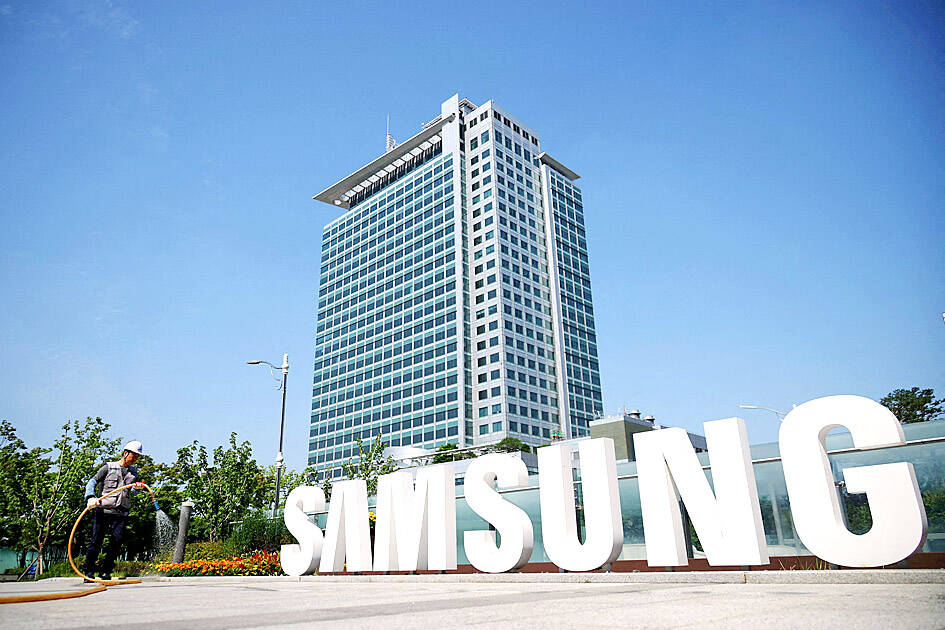Samsung Electronics Co posted its sixth straight quarter of declining operating profit, reflecting weak consumer demand and stoking uncertainty over the timing of a broader tech recovery.
South Korea’s largest company reported a 35 percent fall in operating income to 2.8 trillion won (US$2.1 billion), about 24 percent shy of estimates. Revenue slid more than anticipated to 67 trillion won. For all of last year, Samsung reported its slimmest operating profit in 15 years.
The results underscore how demand for smartphones and the memory chips that power modern electronics remains sluggish given economic uncertainty. It also muddies the outlook for a market recovery that many investors had hoped would emerge this year. Last month, rival Micron Technology Inc delivered a better-than-projected revenue forecast that suggested data center construction may make up for lukewarm computing and mobile device markets.

Photo: Reuters
“This shows that the rebound is slower than we all thought,” Counterpoint Technology Market Research director Tom Kang said. “Prices are not rising that fast and the demand from certain sectors is not that strong.”
Samsung’s consumer electronics unit also took a hit from fierce competition and higher marketing costs, while profit from its smartphone business likely came in toward the lower end of analysts’ estimates, CLSA Securities Korea Ltd analyst Sanjeev Rana said.
However, there are signs of recovery. South Korea’s semiconductor industry in November recorded the largest gains in years in both production and shipments. Given rising memory prices and improving demand, “it is likely that Samsung’s chip business will return to profitability within the first half of 2024,” Rana said.
Investors will want to hear about Samsung’s longer-term investment plans, particularly in the field of artificial intelligence (AI), when executives preside over the release of its full results on Jan. 31.
The company now aims to catch up with rival SK Hynix Inc in the burgeoning field of high-density memory chips, where it plans to increase capacity by 2.5 times this year. HBM, an advanced chip that handles data more quickly, works with hardware such as Nvidia Corp’s accelerators to speed up data processing for intensive tasks like training AI models.
Hynix chief executive officer Kwak Noh-jung told reporters he expected AI demand to help double the firm’s market value over three years.
“Samsung may have to gain market share in AI chips to achieve solid profit growth in 2024,” Bloomberg Intelligence analysts Masahiro Wakasugi and Phu Pham wrote in a note.
Samsung is also counting on a new lineup of devices and foldables to drive growth this year. The company is preparing to unveil its latest gadgets in the US later this month, at a time investors worry Apple Inc’s iPhone 15 might be running out of steam mere months after launch.

With an approval rating of just two percent, Peruvian President Dina Boluarte might be the world’s most unpopular leader, according to pollsters. Protests greeted her rise to power 29 months ago, and have marked her entire term — joined by assorted scandals, investigations, controversies and a surge in gang violence. The 63-year-old is the target of a dozen probes, including for her alleged failure to declare gifts of luxury jewels and watches, a scandal inevitably dubbed “Rolexgate.” She is also under the microscope for a two-week undeclared absence for nose surgery — which she insists was medical, not cosmetic — and is

CAUTIOUS RECOVERY: While the manufacturing sector returned to growth amid the US-China trade truce, firms remain wary as uncertainty clouds the outlook, the CIER said The local manufacturing sector returned to expansion last month, as the official purchasing managers’ index (PMI) rose 2.1 points to 51.0, driven by a temporary easing in US-China trade tensions, the Chung-Hua Institution for Economic Research (CIER, 中華經濟研究院) said yesterday. The PMI gauges the health of the manufacturing industry, with readings above 50 indicating expansion and those below 50 signaling contraction. “Firms are not as pessimistic as they were in April, but they remain far from optimistic,” CIER president Lien Hsien-ming (連賢明) said at a news conference. The full impact of US tariff decisions is unlikely to become clear until later this month

GROWING CONCERN: Some senior Trump administration officials opposed the UAE expansion over fears that another TSMC project could jeopardize its US investment Taiwan Semiconductor Manufacturing Co (TSMC, 台積電) is evaluating building an advanced production facility in the United Arab Emirates (UAE) and has discussed the possibility with officials in US President Donald Trump’s administration, people familiar with the matter said, in a potentially major bet on the Middle East that would only come to fruition with Washington’s approval. The company has had multiple meetings in the past few months with US Special Envoy to the Middle East Steve Witkoff and officials from MGX, an influential investment vehicle overseen by the UAE president’s brother, the people said. The conversations are a continuation of talks that

CHIP DUTIES: TSMC said it voiced its concerns to Washington about tariffs, telling the US commerce department that it wants ‘fair treatment’ to protect its competitiveness Taiwan Semiconductor Manufacturing Co (TSMC, 台積電) yesterday reiterated robust business prospects for this year as strong artificial intelligence (AI) chip demand from Nvidia Corp and other customers would absorb the impacts of US tariffs. “The impact of tariffs would be indirect, as the custom tax is the importers’ responsibility, not the exporters,” TSMC chairman and chief executive officer C.C. Wei (魏哲家) said at the chipmaker’s annual shareholders’ meeting in Hsinchu City. TSMC’s business could be affected if people become reluctant to buy electronics due to inflated prices, Wei said. In addition, the chipmaker has voiced its concern to the US Department of Commerce